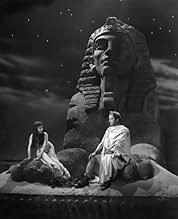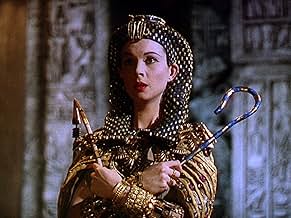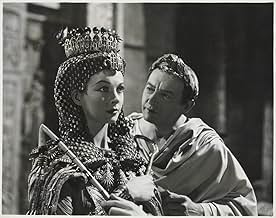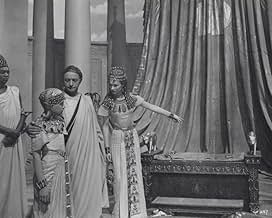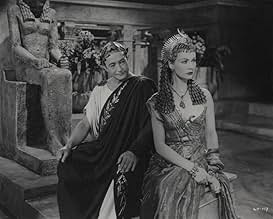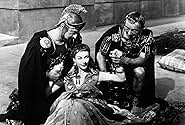IMDb RATING
6.2/10
3.4K
YOUR RATING
At the height of the Roman Civil War, a young Cleopatra (Vivien Leigh) meets a middle-aged Julius Caesar (Claude Rains), who teaches her how to rule Egypt.At the height of the Roman Civil War, a young Cleopatra (Vivien Leigh) meets a middle-aged Julius Caesar (Claude Rains), who teaches her how to rule Egypt.At the height of the Roman Civil War, a young Cleopatra (Vivien Leigh) meets a middle-aged Julius Caesar (Claude Rains), who teaches her how to rule Egypt.
- Nominated for 1 Oscar
- 2 nominations total
Anthony Eustrel
- Achillas
- (as Antony Eustrel)
James McKechnie
- 2nd. Centurion
- (as James Mc Kechnie)
Featured reviews
Cleopatra and Julius Caesar carry on an arch flirtation, while spouting epigrams courtesy of George Bernard Shaw, in this literate, exuberant and thoroughly enjoyable movie. "Caesar and Cleopatra" stands out against the typical British production, which tends to be drab and morose. (Other notable exceptions are the works of Pressberger & Powell, the Korda brothers and Olivier.)
Claude Rains is perfectly cast as the cynical, world-weary and "ready for the knife" Julius Caesar. I'm not sure if it's makeup, or perhaps lighting, but Rains's face looks like it was taken from one of those memorial portraits in the Roman catacombs. In any case, while it may be Caesar's countenance we see, it's Shaw's voice we hear. I love Claude Rains in everything, but there's an intimacy with Rains here that makes "Caesar and Cleopatra" one of my Rains favorites.
And Vivian Leigh. What can I say? Her Cleopatra is Scarlett O'Hara, except that while Scarlett's flirtations were matters of the heart, Cleopatra's were purely matters of state. In the beginning Cleopatra is a sheltered, naive...well, princess. By the end, she has learned well at Caesar's knee and possesses the ruthlessness and guile of statecraft - she is a queen.
Another delight is Stewart Granger's swashbuckling Apollodorus, and Flora Robson has a delicious part as Cleopatra's nursemaid Ftatateeta. Robson is well qualified as a tutor of royalty, having herself played Queen Elizabeth in "Fire over England".
Like another classic British spectacle, "The Four Feathers," "Caesar and Cleopatra" is one of the treasures in my film archive which I view repeatedly alone.
Claude Rains is perfectly cast as the cynical, world-weary and "ready for the knife" Julius Caesar. I'm not sure if it's makeup, or perhaps lighting, but Rains's face looks like it was taken from one of those memorial portraits in the Roman catacombs. In any case, while it may be Caesar's countenance we see, it's Shaw's voice we hear. I love Claude Rains in everything, but there's an intimacy with Rains here that makes "Caesar and Cleopatra" one of my Rains favorites.
And Vivian Leigh. What can I say? Her Cleopatra is Scarlett O'Hara, except that while Scarlett's flirtations were matters of the heart, Cleopatra's were purely matters of state. In the beginning Cleopatra is a sheltered, naive...well, princess. By the end, she has learned well at Caesar's knee and possesses the ruthlessness and guile of statecraft - she is a queen.
Another delight is Stewart Granger's swashbuckling Apollodorus, and Flora Robson has a delicious part as Cleopatra's nursemaid Ftatateeta. Robson is well qualified as a tutor of royalty, having herself played Queen Elizabeth in "Fire over England".
Like another classic British spectacle, "The Four Feathers," "Caesar and Cleopatra" is one of the treasures in my film archive which I view repeatedly alone.
Shaw was a wonderful historian with a deadly eye for irony. Claude Rains brings off Caesar with withering poise and breezy wit, standing tall above the flashing eye of an Egyptian hurricane named Cleopatra (Vivien Leigh). Caesar's aide-de-camp is an affable bear of a man named Rufio (Basil Sydney), who mainly just keeps his eye on Caesar. Cleopatra is likewise sheltered by her scheming counselor Ftatateeta (Flora Robson), a name that not even Caesar can pronounce. Character actor Cecil Parker as Britannus adds quaintness and serendipity to an already splendid alchemy of spotty characters. The film moves by turns through a narrow skein of classical history as the reliquarian Egyptian world gives way to a streamlined Roman one. Along the way, we witness the contending parties encompassed and entangled in a delightful pantheon of wit, irony, satire, morals, manners, and adventure. Overall, a tremendously facile projection of one of England's sharpest satirical voices, G.B. Shaw.
Impressive acting is the highlight of 1945's "Caesar and Cleopatra," a British production starring Vivien Leigh, Claude Rains, Stewart Granger, Flora Robson and Francis L. Sullivan. In smaller roles, you can spot Michael Rennie, Kay Kendall and Jean Simmons.
This production was not without its problems - made during World War II, bombings often delayed the filming; there was a five-week break while Vivien Leigh recovered from a miscarriage; and there was a shortage of materials to build the sets. Nevertheless, for a British film, this is a real spectacle and made in color, which was also unusual back then.
Shaw's Cleopatra (Leigh) is a childlike girl/woman who has hitting matches with her younger brother, runs, giggles, talks fast and becomes nervous at the thought of meeting the great Caesar (Rains). In the beginning, she meets him without realizing it.
The two have a flirtation while he teaches her how to be a queen. Shaw's Caesar is an old man, a great warrior and a benevolent ruler who rules with a velvet glove rather than a sword.
Rains and Leigh are wonderful in their roles. Rains, as someone stated, with his Caesar haircut, weary face and beautiful profile looks as if he stepped out of that time period. His mastery of Shaw's language is magnificent, and he really holds the film together.
The stunningly beautiful Leigh, white-faced with glorious cheekbones and dazzling eyes, is a whimsical Cleopatra at first. She matures and becomes calmer and more regal as she learns how to be a queen, but she falls back into her childish ways in the presence of Caesar, particularly when he promises to send her Marc Anthony.
They say the camera adds 10 pounds - frankly, I'm surprised any of the actors could see Leigh, she is so tiny. She gives a sprightly, energetic performance.
Shaw's Cleopatra is 16 (though in reality she is 20 or 21) - Leigh was 32 at the time of filming and comes off like the teenager Shaw wrote.
Stewart Granger as Apollodorus shows off his very hunky physique - no wonder he came to the attention of Hollywood. As two aides of Caesar's, Basil Sydney as Ruffio and Cecil Parker as Britanus give fine performances.
Finally, Flora Robson as the protective, tough nursemaid of Cleopatra's, Ftatateeta, sinks her teeth into the role and is a force to contend with.
This movie flopped, probably because audiences thought it was going to be some huge spectacle - it's big for England, but it's not DeMille.
Still, it's a real treat to see one of the classics done by two great actors who were well-trained and well-equipped to perform George Bernard Shaw.
This production was not without its problems - made during World War II, bombings often delayed the filming; there was a five-week break while Vivien Leigh recovered from a miscarriage; and there was a shortage of materials to build the sets. Nevertheless, for a British film, this is a real spectacle and made in color, which was also unusual back then.
Shaw's Cleopatra (Leigh) is a childlike girl/woman who has hitting matches with her younger brother, runs, giggles, talks fast and becomes nervous at the thought of meeting the great Caesar (Rains). In the beginning, she meets him without realizing it.
The two have a flirtation while he teaches her how to be a queen. Shaw's Caesar is an old man, a great warrior and a benevolent ruler who rules with a velvet glove rather than a sword.
Rains and Leigh are wonderful in their roles. Rains, as someone stated, with his Caesar haircut, weary face and beautiful profile looks as if he stepped out of that time period. His mastery of Shaw's language is magnificent, and he really holds the film together.
The stunningly beautiful Leigh, white-faced with glorious cheekbones and dazzling eyes, is a whimsical Cleopatra at first. She matures and becomes calmer and more regal as she learns how to be a queen, but she falls back into her childish ways in the presence of Caesar, particularly when he promises to send her Marc Anthony.
They say the camera adds 10 pounds - frankly, I'm surprised any of the actors could see Leigh, she is so tiny. She gives a sprightly, energetic performance.
Shaw's Cleopatra is 16 (though in reality she is 20 or 21) - Leigh was 32 at the time of filming and comes off like the teenager Shaw wrote.
Stewart Granger as Apollodorus shows off his very hunky physique - no wonder he came to the attention of Hollywood. As two aides of Caesar's, Basil Sydney as Ruffio and Cecil Parker as Britanus give fine performances.
Finally, Flora Robson as the protective, tough nursemaid of Cleopatra's, Ftatateeta, sinks her teeth into the role and is a force to contend with.
This movie flopped, probably because audiences thought it was going to be some huge spectacle - it's big for England, but it's not DeMille.
Still, it's a real treat to see one of the classics done by two great actors who were well-trained and well-equipped to perform George Bernard Shaw.
Bernard Shaw does not perhaps adapt too well to the screen, but, in my opinion, this adaptation is particularly successful and probably the best of them all, although one video edition in the UK didn't even risk mentioning Shaw's name anywhere on the box, prefering to market it as mere exotic spectacle. It is of course all that, but as with everything Shaw wrote, much, much more, and is essentially about IDEAS, (not necessarily, as has often been contended, always Shaw's own personal convictions). Vivien Leigh as Cleopatra gives yet another sublime and first-rate performance as she progresses from frightened teenager to an imperious Queen with a real understanding of power. (The scene in which she whips a hapless slave in order to experience the "thrill" of total power, strangely pre-echoes the psychology of the much misunderstood SALO). Mention too must also be made of the superb musical score by Georges Auric, and admiration expressed for the sheer audacity of producer Pascal for making such a lavish and expensive production in poverty-stricken post-war Britain. Well worth watching.
The film overall is slow and laborous but Vivien's performance as Cleopatra is sublime. I wish she was the only cast member! Her range is incredible from a young, playful kitten of a queen to a dignified ruler of Egypt.
Seeing Vivien in full Cleopatra garb is breath-taking! She raises beauty to a different level.
Seeing Vivien in full Cleopatra garb is breath-taking! She raises beauty to a different level.
Did you know
- TriviaClaude Rains made history by being the first actor to receive a salary of US$1,000,000 for his portrayal of Julius Caesar.
- GoofsCaesar refers to his nose as "rather long" and "a Roman nose," but the idea of a "Roman nose" was not introduced until almost 150 years later, when the Emperor Hadrian erected statues of his favorite, Antinous, throughout the Empire (where many of the people had never seen a Roman), and Antinous's long nose was taken as typical of Romans (even though Antinous was a Greek).
- Quotes
Julius Caesar: And so to the end of history, murder shall breed murder, always in the name of right, and justice, and peace, until the gods create a race of men that can understand.
- Crazy creditsClosing credits cast list finishes with And The Crowd.
- ConnectionsFeatured in Great Performances: Laurence Olivier: A Life (1983)
- How long is Caesar and Cleopatra?Powered by Alexa
Details
Box office
- Budget
- £1,278,000 (estimated)
- Runtime
- 2h 3m(123 min)
- Aspect ratio
- 1.37 : 1
Contribute to this page
Suggest an edit or add missing content


